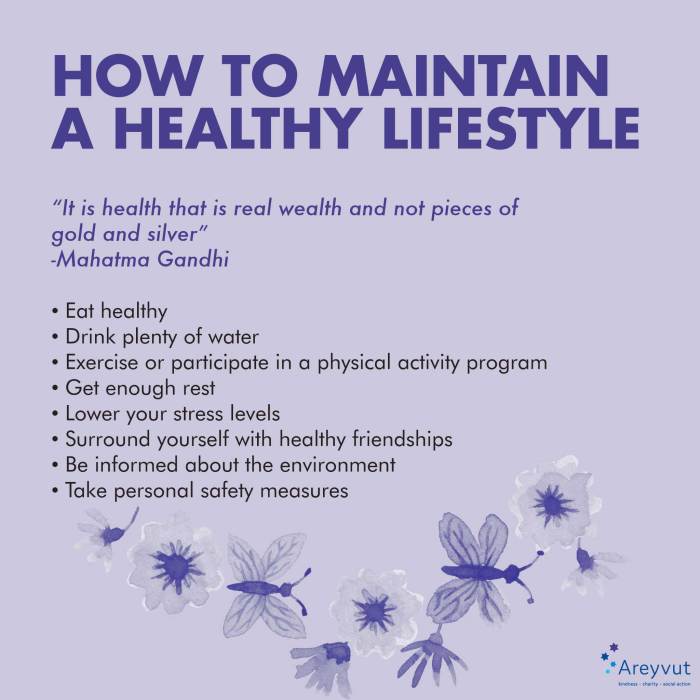As Healthy Lifestyle Tips takes center stage, this opening passage beckons readers with american high school hip style into a world crafted with good knowledge, ensuring a reading experience that is both absorbing and distinctly original.
Get ready to dive into the key aspects of maintaining a healthy lifestyle through nutrition, exercise, mental well-being practices, and more. Let’s explore how small changes can lead to significant improvements in your overall well-being.
Benefits of a Healthy Lifestyle
Maintaining a healthy lifestyle is crucial for overall well-being. It involves making choices that benefit your physical, mental, and emotional health. By prioritizing your health, you can experience a range of positive outcomes that can enhance your quality of life.
Key Benefits of Following a Healthy Lifestyle
- Improved physical health: Regular exercise and a balanced diet can help prevent chronic diseases such as heart disease, diabetes, and obesity.
- Increased energy levels: Eating nutritious foods and staying active can boost your energy levels, making you feel more alert and productive.
- Enhanced mental well-being: A healthy lifestyle can reduce stress, anxiety, and depression, promoting better mental health.
- Better sleep quality: By adopting healthy habits, you can improve your sleep patterns, leading to a more restful night’s sleep.
- Longevity: Research shows that individuals who follow a healthy lifestyle tend to live longer and have a higher quality of life in their later years.
How a Healthy Lifestyle Impacts Overall Well-being, Healthy Lifestyle Tips
- Physical health and mental well-being are interconnected: Taking care of your body can have a positive impact on your mental health, leading to improved mood and cognitive function.
- Reduced risk of chronic diseases: By maintaining a healthy weight, eating a balanced diet, and staying active, you can lower your risk of developing conditions like heart disease and diabetes.
- Enhanced immune function: A healthy lifestyle can strengthen your immune system, making you less susceptible to illnesses and infections.
Nutrition Tips for a Healthy Lifestyle

Eating a balanced diet is crucial for maintaining a healthy lifestyle. It provides the necessary nutrients to keep your body functioning at its best.
Balanced Meals for a Healthy Diet
- Breakfast: Greek yogurt with mixed berries and a sprinkle of granola.
- Lunch: Grilled chicken salad with a variety of colorful vegetables and a vinaigrette dressing.
- Dinner: Baked salmon with quinoa and roasted asparagus.
Significance of Hydration
Staying hydrated is key to overall health. Water helps regulate body temperature, aids digestion, and flushes out toxins.
Incorporating Fruits and Vegetables
- Snack on apple slices with almond butter or carrot sticks with hummus.
- Add spinach or kale to your morning smoothie for an extra boost of nutrients.
Role of Portion Control
Practicing portion control can help prevent overeating and maintain a healthy weight. Use smaller plates, measure servings, and be mindful of portion sizes.
Exercise and Fitness Recommendations
Regular exercise is a crucial component of a healthy lifestyle, as it helps improve overall physical and mental well-being. It is essential to incorporate a variety of exercises into your routine to target different muscle groups and promote cardiovascular health.
Types of Exercises for Various Fitness Levels
- Low-impact exercises like walking or swimming are ideal for beginners or those with joint issues.
- Intermediate fitness levels can benefit from activities like cycling, dancing, or light weightlifting.
- Advanced individuals may enjoy high-intensity interval training (HIIT), running, or CrossFit workouts.
Creating a Workout Routine
- Set specific goals for your fitness journey, whether it’s weight loss, muscle gain, or improved endurance.
- Include a mix of cardio, strength training, and flexibility exercises to work different areas of the body.
- Schedule regular workout sessions and vary your routine to prevent boredom and plateauing.
Importance of Cardiovascular Exercises
Cardiovascular exercises, such as running, cycling, or swimming, are essential for improving heart health and increasing endurance. These activities help strengthen the heart muscle, lower blood pressure, and boost overall cardiovascular fitness.
Strength Training for a Healthy Lifestyle
- Strength training, including weightlifting and bodyweight exercises, helps build muscle mass and increase metabolism.
- Regular strength training sessions can improve bone density, posture, and overall strength, reducing the risk of injuries and age-related muscle loss.
- Include exercises targeting major muscle groups, such as squats, deadlifts, and push-ups, in your routine for optimal results.
Mental Well-being Practices: Healthy Lifestyle Tips

Maintaining mental well-being is crucial for a healthy lifestyle, as it impacts our overall health and quality of life. Stress management, mindfulness, quality sleep, and a positive mindset all play key roles in promoting mental wellness.
Significance of Stress Management
Stress can have detrimental effects on our physical and mental health, leading to issues like anxiety, depression, and high blood pressure. It is essential to manage stress effectively to maintain a healthy lifestyle.
- Practice relaxation techniques such as deep breathing, yoga, or meditation.
- Engage in regular physical activity to reduce stress levels.
- Establish boundaries and learn to say no to avoid overwhelming yourself.
- Seek support from friends, family, or a therapist when needed.
Benefits of Mindfulness and Meditation
Mindfulness and meditation can help reduce stress, improve focus, and promote emotional well-being. These practices can enhance self-awareness and lead to a greater sense of calm and balance in daily life.
- Set aside time each day for mindfulness exercises or meditation.
- Focus on the present moment and practice gratitude for a positive mindset.
- Use mindfulness apps or guided meditation sessions to support your practice.
- Attend mindfulness workshops or classes to deepen your understanding of these practices.
Improving Sleep Quality
Quality sleep is essential for overall well-being, as it allows our bodies and minds to rest and recharge. Poor sleep can contribute to mood swings, lack of focus, and other health issues.
- Establish a bedtime routine and stick to a consistent sleep schedule.
- Create a relaxing sleep environment by keeping your bedroom dark, quiet, and cool.
- Avoid caffeine, electronics, and heavy meals close to bedtime to improve sleep quality.
- Practice relaxation techniques like deep breathing or gentle stretching before bed.
Maintaining a Positive Mindset
A positive mindset can help improve mental well-being, resilience, and overall happiness. By focusing on the good in life and practicing self-care, you can cultivate a positive outlook on life.
- Acknowledge and challenge negative thoughts to promote a more positive mindset.
- Practice self-compassion and treat yourself with kindness and understanding.
- Surround yourself with supportive and positive people who uplift and motivate you.
- Engage in activities that bring you joy and fulfillment to boost your mood and mindset.

